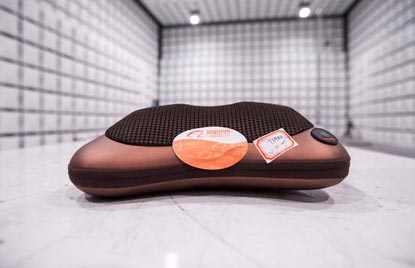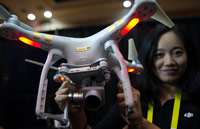CCTV advert auction nets $2.55b
By WEI TIAN (China Daily) Updated: 2012-11-19 23:30Record spending at the annual advertising auction of China Central Television, a barometer of the country's economy, highlighted Chinese businesses' confidence in the consumer market next year despite slowing growth in the world's second-largest economy.
The auction for advertising slots in 2013 held on Sunday by China's top TV broadcaster earned a total of 15.88 billion yuan ($2.55 billion), up 11.4 percent year-on-year.
Liquor company JNC Group was the top bidder, spending 608 million yuan to secure a place for its logo for eight months on four daily slots on the clock which precedes news bulletins on CCTV 13, the broadcaster's news channel.
Other liquor companies also competed fiercely during the 12-hour auction, spending a total of 3.66 billion yuan to promote their brands on CCTV in 2013, nearly 90 percent more than in the previous year.
Slots in the commercial break ahead of Xinwen Lianbo, CCTV's flagship news program, remain the broadcaster's top product, drawing more than 5.4 billion yuan.
Wuliangye Group Co spent 499 million yuan to secure a place on the clock which features immediately prior to Xinwen Lianbo at 7 pm, followed by 352 million yuan from Kweichow Moutai Co, last year's top bidder.
"The records set this year suggest that businesspeople are fully confident about the nation's economic prospects in 2013," said Li Guangdou, an advertising expert who heads a brand consultancy in Beijing.
According to Li, CCTV's advertising revenue has been growing faster than the nation's GDP in the 18 years since the auction started, at an average of 16 to 17 percent annually, but this high growth has come under pressure from the nation's slowing economic growth.
In the first half of 2012, revenue in the domestic advertising market grew 4.2 percent, with television advertising increasing by 4.7 percent.
Both growth rates were slower than the nation's economic expansion, which fell to a three-year low of 7.8 percent during the same period.
"Companies perceived the current economic situation as a trough and bet on rebounding growth in 2013, expecting their spending on CCTV will bring more benefits in the year to come," said Xu Haoran, a brand consultant.
This year's auction attracted more than 1,000 representatives from 251 domestic and overseas bidders.
Apart from the dominance of liquor companies, other notable bidders included food and beverage companies, and e-commerce giants.
Huiyuan Juice Group Ltd secured the exclusive naming rights of Xingguang Dadao, one of China's most popular grassroots talent shows, for 340 million yuan.
Brand competition between beverage makers JDB Group and Guangzhou Pharmaceutical Holdings extended to the auction. The two ended up spending a total of almost 150 million yuan.
But the outlook is not as rosy as it seems. He Haiming, deputy director of CCTV's advertising operations and management center, said most companies had cut their advertising expenditure this year as their budgets were squeezed amid slowing economic growth.
"As for CCTV, this has been the busiest year in my career of more than a decade, in terms of working overtime and visiting clients," He said.
Compared with the previous year's auction, CCTV had fewer prime slots to offer advertisers due to the absence of major sports events in 2013, and regulations to reduce the time advertisements can be broadcast, He said.
Meanwhile, the nation's major television broadcaster faces increasing competition from provincial channels, such as Zhejiang Satellite TV, which drew 1.04 billion yuan in advertising revenue for its hit show Voice of China next year.
But Xu Fan, a professor at Communication University of China, said CCTV's advertising slots would continue to be attractive among bidders due to the broadcaster's reputation and high ratings during major holidays such as the Spring Festival.
Xu was echoed by He Yangqing, vice-president of Gome Electrical Appliances Holding Ltd, who said the company would cut its spending on other media to guarantee advertising expenditure on CCTV due to its high price-performance ratio. The company spent more than 400 million yuan on advertising slots on CCTV in 2013.
Meanwhile, there is still room for growth as the aggregate spending on advertising only accounts for 0.6 percent of China's GDP, compared to an average of 2 percent in developed economies, Li said.
The auction also came soon after the recently concluded 18th National Congress of the Communist Party of China vowed to double national income by 2020, "so there is still huge potential in China's consumer market", said He from CCTV.
- Robots lending hand to China's manufacturing transformation
- China remains biggest chemical fertilizer exporter to Nepal
- Renminbi internationalization makes new strides
- Jaguar Land Rover to recall 11,282 vehicles
- Nationwide fitness plan to boost sports industry
- BYD joins lithium mining in west China's Salt Lake
- More wealthy Chinese demands global asset allocation: report
- US steel industry overprotected: China's commerce ministry


















